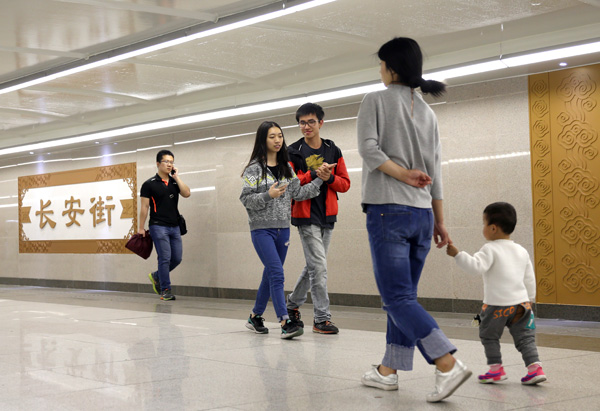25 Beijing underpasses undergo renovations
|
|
|
Pedestrians walk through a renovated underground passage under the Xidan section of Chang’an Avenue in Beijing downtown on Saturday. [Photo/China Daily] |
Beijing will finish restoring 25 pedestrian underpasses this year along Chang’an Avenue, the capital’s central thoroughfare, to upgrade their function and appearance.
The underpasses, built between the mid-1980s and early ’90s, stretch from Jianguomen on the East Second Ring Road to Fuxingmen on the West Second Ring Road.
The city’s transport authority started the revamp at the end of last year after it was deemed that the outdated pathways failed to fit in with the modern streetscape of Chang’an Avenue.
Work on two underpasses, Xidan West and Tian’anmen West, has been completed, and the other 23 are expected to be restored by the end of this year, the authority said. It did not reveal how much was being spent on the project.
A white marble plaque at the entrance of Xidan West underpass bears its name. In the underpass, a gold-mounted jade plaque with the name Chang’an Avenue is on one side of the marble wall and a golden statue with the design of Xidan Memorial Arch is on the other.
“The goal of our design for those underpasses is to be solemn and dignified,” said Liu Yong, deputy chief engineer at the Beijing Municipal Engineering Professional Design Institute.
He said this project should match the style of the streetscape upgrading work along Chang’an Avenue this year.
Duan Wenzhi, head of engineering at Beijing’s road maintenance and management office, said the 25 underpasses will feature similar decorations, but each will have its own characteristic design that takes in the surrounding landmarks.
In addition, Duan said they also fixed issues such as leaks and upgraded the drainage system.
Some will find the underpasses brighter than before, he added, since they adopted LED lights that are stronger, have a longer service life and save energy.
Tu Gang, a commuter who uses the Xidan West underpass to get to work, said he was happy to see the new look.
“I know the restoration was paid for by the municipal government, which means money from every citizen in the capital, but I think it is worthwhile as long as it can last for at least 100 years,” he said. “Most important, the design of the art should have more cultural and historical meaning and artistic elements.”
Chang’an Avenue runs between Tian’anmen Gate, the entrance to the Palace Museum, and Tian’anmen Square.
